Good morning!
Greetings in the name of the father, the Son, and the Holy Spirit.
“You may tell in the hearing of your son and of your grandson how I have dealt harshly with the Egyptians and what signs I have done among them, that you may know that I am the LORD.” (Exodus 10:2b)
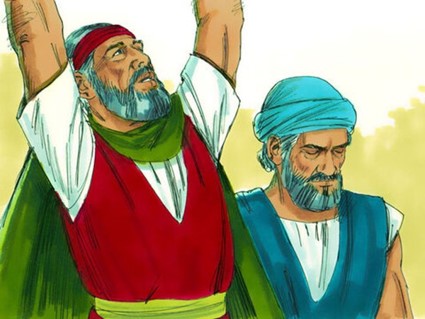
Moses did not understand why God sent him to Pharaoh repeatedly, although Pharaoh, again and again, refused to let the Israelites go. Moses had already sent seven times to Pharaoh, and Pharaoh’s answer was no. It was truly frustrating to go back to Pharaoh while knowing he would not let his fellow Israelites go.
Then how could Moses go back seven times while knowing the negative outcome before going to Pharaoh? Moses believed in God and absolutely trusted God would surely free his fellow Israelites. Without such absolute faith, Moses had already quit. Moses had faith in God that God would free his fellow Israelites because God promised Moses. And the promise was not just with him but his forefathers, Abraham, Isaac, and Jacob. Moses experienced for 80 years God’s presence and His faithfulness. Especially for the last 40 years, God’s hand had molded and shaped Moses, transforming him into God’s holy instrument to glorify His name by leading the Israelites out of Egypt.
Indeed, Moses heard two conflicting messages from God – God would free the Israelites from Pharaoh, but God would also harden Pharaoh’s heart. If we were Moses, how would we resolve these two conflicting messages from God?
Initially, God did not explain why God gave two conflicting messages to Moses. Even so, Moses faithfully followed God’s command seven times and experienced what God predicted – seven failures. Yes, Moses was a truly humble and obedient servant to God. Bible says,
“Now Moses was very humble—more humble than any other person on earth.” (Numbers 12:3)
Yes, who would go back again and again when your boss tells you will surely fail if you go and do what the boss asks? Perhaps one or two times. Then it would get very difficult to go back again the third time. How many times did Moses go? Moses had already gone seven times.
However, Moses also hoped and hoped whenever he went to Pharaoh. Why? He saw the misery of his fellow Israelites, and he loved them to see them being free from slavery in Egypt. Moses’ faith was cultivated for forty years by God’s hand with Godly love, and his heart for his fellow Israelites made him go and go. Faith and love in hope cannot be broken under any circumstances, especially with Moses’ humility to God.
Pharaoh had absolute power over Egypt, and people served him as a god, but he did not have the love, faith, hope, and humility that Moses had because none of them did mean anything to him. Most of all, why should Pharaoh, the king of Egypt, the most powerful nation at that time, have Moses’ humility? In the land of Egypt, there was none above Pharaoh in Pharaoh’s eyes.
God had full of mercy and love for Moses. God was always faithful to Moses throughout Moses’ humbly obedient journey with God. God did not let Moses alone, although it might look like God did nothing for Moses throughout the journey. God indeed made Pharaoh increasingly vulnerable to Moses.
Initially, to Moses’ surprise, Pharaoh could duplicate God’s plagues using his own magicians. However, soon his magicians’ power quickly ran out before God. When the third plague hit the land, Pharaoh’s magicians shouted,
“This is the finger of God.” (Exodus 8:19b)
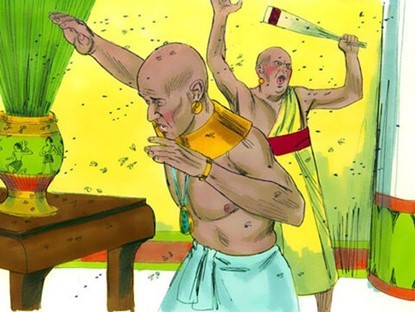
Three times, God made Pharaoh negotiate with Moses about a term to release the Israelites – how and whom would Pharaoh send out from Egypt. For each negotiation session, Moses felt it was an oasis in the middle of a desert, which refreshed Moses’ heart while giving him the strength to continue following God. God knew Moses’ heart. God also knew Moses would remain humble and obediently follow God while demonstrating his utmost faithfulness to God, although Moses was still a mere human influenced by what he did hear, think, and see, not as God.
When Pharaoh attempted to negotiate with Moses about a term to release, Moses was truly delighted. Pharaoh presented a favorite term, promising to release the Israelites, and Moses joyfully accepted the term. Moses prayed to God to stop the plague believing the term agreed with Pharaoh. But as soon as the ongoing plague ceased. Moses had to witness Pharaoh’s sudden move of withdrawing the term of releasing his fellow Israelites.
What a disappointment! It was very hard on Moses. Then Moses prayed to God for God’s help. While praying to God, Moses remembered God’s word — Pharaoh would harden his heart. Then Moses was comforted. Despite his disappointment, Moses stood up again, raised his hands high, and thanked God because He did what He promised. One thing Moses clang on was not to lose hope in God. How could Moses have such hope? Indeed, the hope itself came from God, who dearly loved Moses and was infinitely faithful to Moses and his fellow Israelites.

Moses was personally disappointed but endured in faith in God while hoping in God. As going through these humanly disappointing cycles seven times, Moses’ faith also grew strong in God while deepening his relationship. If Moses quit or complained to God, Moses could not have had reached the extreme maturity of his faith. It is one thing we want to copy as walking with God, the walk given to us by God.
God, of course, was neither indifferent nor ignoring Moses’ struggles. Seeing through all human beings’ hearts, God knew when and what kind of help and support from God Moses needed to continue walking the walk given to Moses. God carefully and patiently guided Moses through the paths of righteousness with His special love and care.
As soon as Moses was ready, God revealed His plan why God let Pharaoh repetitively harden his heart and not allow the Israelites to leave Egypt. It was for Moses and His beloved people living at that time, and especially for the future thousands of generations to come. God made a solemn covenant with Abraham for Abraham and Abraham’s descendants to come – the thousands of generations. God kept His covenant and was faithfully executing it through Moses, and Moses realized this secret. If we were Moses, realizing this glorious plan of God, how would we respond to God? It would truly help us to overcome yet another failure to come. Yes, it would be painful because we could not get what we truly wanted to free the enslaved Israelites, but we clearly saw God’s hand busy preparing and providing what God promised.
Thus, Moses gave thanks to God for revealing God’s plan, although Moses had experienced failures seven times already. Moses was ready for yet another God’s command destined to fail. God sent Moses to Pharaoh, and Moses relayed what God commanded to say to Pharaoh about the eighth plague,
“This is what the LORD, the God of the Hebrews, says: How long will you refuse to submit to me? Let my people go, so they can worship me. If you refuse, watch out! For tomorrow I will bring a swarm of locusts on your country. They will cover the land so that you won’t be able to see the ground. They will devour what little is left of your crops after the hailstorm, including all the trees growing in the fields. They will overrun your palaces and the homes of your officials and all the houses in Egypt. Never in the history of Egypt have your ancestors seen a plague like this one!” (Exodus 10:3b-6a)
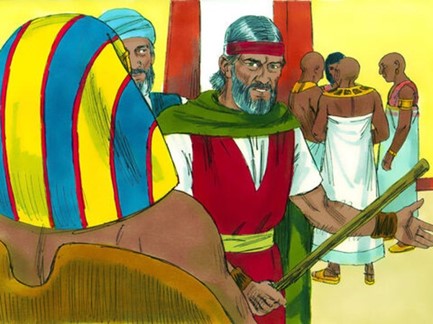
Moses clearly understood why he had to repetitively come to Pharaoh, although Pharaoh would refuse to hear him. Or initially, Pharaoh showed hope of freeing the Israelites, but in the end, Pharaoh changed his promise by hardening his heart. Even so, with God’s help, Moses could see a subtle but clear sign of changing dynamics between Moses and Pharaoh. Although Pharaoh pretended nothing happened, Pharaoh became weaker and vulnerable to Moses as Moses visited and proclaimed God’s message. Thus after boldly announcing God’s message, Moses turned and confidently left Pharaoh in God.
Moses felt that Pharaoh would do something different for this time. The eighth plague of locusts would make Pharaoh also lose the wheat and the emmer wheat spared because they had not yet sprouted from the ground when the hail plague came on Egypt.
The eighth plague would be really painful to Pharaoh. Soon Pharaoh’s officials came to Pharaoh and appealed to him.
“How long will you let this man hold us hostage? Let the men go to worship the LORD their God! Don’t you realize that Egypt lies in ruins?” (Exodus 10:7b)
Pharaoh gave an order to bring back Moses and Aaron. “All right,” Pharaoh told them, “go and worship the LORD your God. But who exactly will be going with you?”
Moses replied, “We will all go—young and old, our sons and daughters, and our flocks and herds. We must all join together in celebrating a festival to the LORD.”
Pharaoh retorted, “The LORD will certainly need to be with you if I let you take your little ones! I can see through your evil plan. Never! Only the men may go and worship the LORD your God, since that is what you requested.” Then Pharaoh hardened his heart and threw them out of the palace.
Then God said to Moses, “Raise your hand over the land of Egypt to bring on the locusts. Let them cover the land and devour every plant that survived the hailstorm.”
So Moses raised his staff over Egypt, and God caused an east wind to blow over the land all that day and through the night. When morning arrived, the east wind had brought the locusts. And the locusts swarmed over the whole land of Egypt, settling in dense swarms from one end of the country to the other. It was the worst locust plague in Egyptian history, and there has never been another one like it. For the locusts covered the whole country and darkened the land. They devoured every plant in the fields and all the fruit on the trees that had survived the hailstorm. Not a single leaf was left on the trees and plants throughout the land of Egypt.
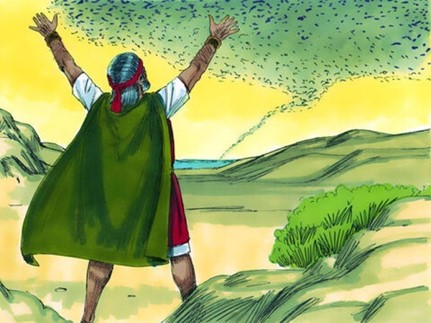
Seeing is believing. Pharaoh saw what’s happened. Then Pharaoh quickly summoned Moses and Aaron. “I have sinned against the LORD your God and against you,” he confessed. “Forgive my sin, just this once, and plead with the LORD your God to take away this death from me.” Pharaoh truly begged because his country was on the verge of collapse without any food left on the fields.
So Moses left Pharaoh’s court and pleaded with God. God responded by shifting the wind, and the strong west wind blew the locusts into the Red Sea. Not a single locust remained in all the land of Egypt. But God hardened Pharaoh’s heart again, so he refused to let the people go. Why? Pharaoh was a part of God’s plan, although Pharaoh believed he did all things as if he had full control over his decisions.
Was Moses disappointed? No. For this time, Moses clearly knew what to believe, see, and hope for. Things happening now were part of God’s plan, although he could not understand it. Indeed, he could never understand God and His plan. But Moses joyfully returned to his place while giving thanks to God, the LORD.
For I know the plans I have for you,” declares the LORD, “plans to prosper you and not to harm you, plans to give you hope and a future. (Jeremiah 29:11)
After returning, Moses prayed to God in hope and faith. His prayer was to no matter what God commanded him to do and to be God’s most humble and faithful servant to God who joyfully followed God’s command not by sight but by faith. God heard Moses’ prayer and was extremely pleased with him.
Soon, God came to Moses again. God told Moses, “Lift your hand toward heaven, and the land of Egypt will be covered with a darkness so thick you can feel it.” So Moses lifted his hand to the sky, and a deep darkness covered the entire land of Egypt for three days. During all that time, the people could not see each other, and no one moved. But there was light as usual where the people of Israel lived.
Please note that God did not even send Moses to Pharaoh this time. Why? God knew Moses, who would do exactly what God said as he did eight times. There was no reason to send Moses again. Moses was fully ready to do God’s monumental and glorious work of freeing the Israelites from the hand of Pharaoh. What was left was to deal with Pharaoh to get to the glorious outcome that many nations would praise God, and most of all, His people and their descendants would praise His name forever.
How joyful is it to listen to our children’s thanksgiving to us from their mouths? Such joy only comes from our own children, whom we love most. Then please visualize how much God would be pleased with the sound of His children’s forever praises.
Pharaoh voluntarily called for Moses though Moses did not deliver any warning message to Pharaoh. Pharaoh clearly knew why his nation was getting the ninth plague of darkness. Pharaoh said, “Go and worship the LORD” Moses could not believe what he was hearing. Moses was still not convinced that it was not what God planned to give to him, the Israelites, and the thousands of generations to come. Moses felt God prepared even much more grandiose than Pharaoh would say, which would be so great that none of the future generations would ever forget.
Then Pharaoh suddenly added one condition, “But leave your flocks and herds here. You may even take your little ones with you.” Ah, Pharaoh was not yet fully ready.
“No,” Moses boldly said, “you must provide us with animals for sacrifices and burnt offerings to the LORD our God. All our livestock must go with us, too; not a hoof can be left behind. We must choose our sacrifices for the LORD our God from among these animals. And we won’t know how we are to worship the LORD until we get there.”
Pharaoh had gone through nine plagues. For this time, he kindly offered the best term that he maximally afforded. Pharaoh could not send away all flocks and herds along with all enslaved Israelites at once. Then Pharaoh’s nation would immediately fall into bankruptcy. Pharaoh needed all the flocks and herds, although he might lose the Israelites, the enslaved laborers. Yes, it was the best and final offer of Pharaoh.
Thus, Moses’ answer extremely agitated Pharaoh. “Get out of here!” Pharaoh shouted at Moses. “I’m warning you. Never come back to see me again! The day you see my face, you will die!”
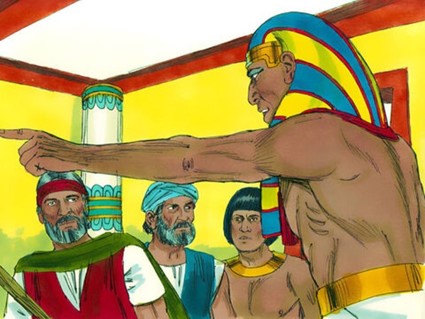
Moses even heard a death threat from Pharaoh at this time. Moses knew it was the last negotiation with Pharaoh. Moses realized that God would finally do something so dramatic that thousands of generations would remember what God had done for His people.
“Very well,” Moses replied. “I will never see your face again.”
The ninth plague made Moses even stronger in faith in God. He could connect God’s covenant and the things happening in the world he lived in, which did not provide what he wanted. But Moses knew God prepared even more glorious than he could imagine. Moses believed and gave thanks as getting out of the palace. Moses even heard a death threat from Pharaoh, but it was nothing to him. He trusted in God while hoping to see God’s great hand as He promised. Yes, Moses was truly ready to lead the two million Israelites with all belongs, including all flocks and herds.
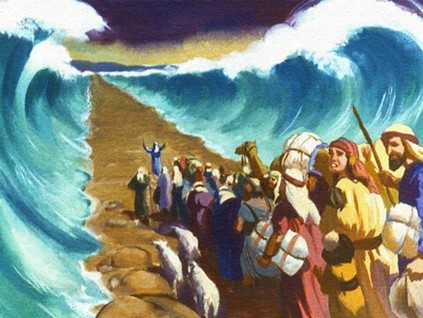
Pharaoh did everything he could by employing his magicians and all of his wisdom. But Pharaoh and his nation got hit by nine plagues from God. The Aftermath of Pharaoh was as follows: Pharaoh had his strong armies, his royal people, the Egyptians, and his two million strong slaves, the Israelites. He was still in charge overall over the most powerful nation on earth, although the nine plagues inflicted some damage on his powerful nation. He knew he was still the king and a god in Egypt. Pharaoh decided to continue the fight for his country. The first thing was first. He would have to get rid of Moses. Pharaoh decided to kill Moses in his heart, but in his anger, he vocalized it. Yes, Pharaoh was fully ready to control the situation to continue reigning in Egypt as the only king of his nation.
God was with Moses, but Pharaoh was with himself while relying on what he had – his earthly power, his magicians, his people, and his slaves. Moses was getting stronger, although Moses had nothing but God. Pharaoh was getting weaker, although he had everything available on earth. Every time meeting with Moses, a shepherd from the remote Midian wildness, Pharaoh got more and more pressure from the shepherd because the shepherd brought God’s message. As the pressure mounted, Pharaoh made every effort to cling to his own power. But it only made God’s plan perfect. Pharaoh had never known what he was doing, but he indeed diligently executed God’s plan without knowing. On the other hand, Moses fully trusted in God more and more as going through the disappointing nine outcomes. Moses believed in God and was sure to see God’s plan to rescue the Israelites enslaved in Egypt as something so glorious that thousands of generations would continue praising God while praising God.
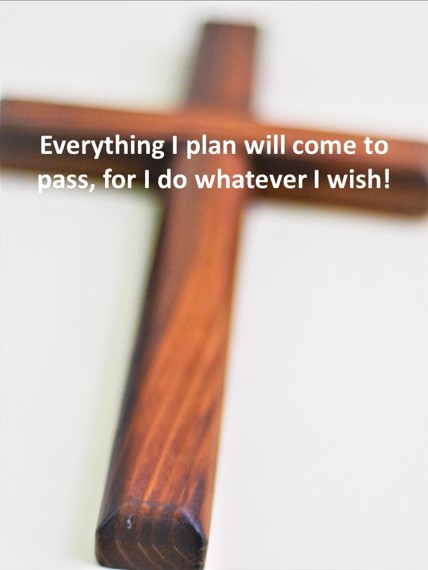
God is our refuge and strength,
always ready to help in times of trouble.
So we will not fear when earthquakes come
and the mountains crumble into the sea.
Let the oceans roar and foam.
Let the mountains tremble as the waters surge! (Psalm 46:1-3)
Only I can tell you the future before it even happens. Everything I plan will come to pass, for I do whatever I wish. (Isaiah 46:10)
ing I plan will come to pass, for I do whatever I wish. (Isaiah 46:10)
